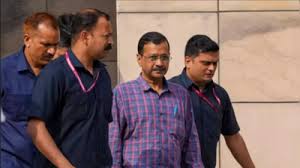NEW DELHI: The CBI today informed a Delhi court it has obtained the necessary sanction from the “competent authority” to prosecute Delhi Chief Minister Arvind Kejriwal in a corruption case linked to the excise ‘scam’.
The probe agency told Special Judge Kaveri Baweja it had also got sanction to prosecute AAP MLA Durgesh Pathak in the case as required under Section 19 of the Prevention of Corruption Act.
The Special Judge, who had on August 12 granted the CBI 15 days to get the requisite sanction, will consider on August 27 supplementary chargesheets/ complaints filed by the CBI and ED against him.
Meanwhile, Kejriwal failed to get any immediate relief from the Supreme Court on Friday as it deferred to September 5 the hearing on his pleas seeking bail and challenging the June 26 arrest by the CBI in a corruption case linked to the excise policy ‘scam’.
Kejriwal has filed two petitions, one challenging dismissal of his bail plea by the Delhi HC and the other against his arrest by the CBI in the case. The Delhi HC had dismissed both his petitions on August 5.
On July 12, the SC had granted Kejriwal interim bail in the money laundering case linked to the excise ‘scam’. Senior AAP leaders Sanjay Singh and former Manish Sisodia have already been enlarged on bail in the case by the SC. In an affidavit filed in response to Kejriwal’s petition, the CBI defended his arrest before the top court, saying it was necessary as he remained “evasive and non-cooperative” during his interrogation on his role in the excise policy ‘scam’ and that he was arrested on June 26 only after being examined on June 25.
“This was necessary since he was to be confronted with the evidence on record, when it was necessary for the just conclusion of the investigation herein, more specifically since the petitioner was purposely derailing the investigation. The necessity to arrest also arose based on the materials on record and since the petitioner chose to remain evasive and non-cooperative during his examination on June 25,” the CBI said.
“The petitioner is simply attempting to politically sensationalise the case before this court, despite repeated orders passed by various courts being prima facie satisfied of the commission of the offences herein, for which cognisance already has been taken. Such unwarranted averments are liable to be discarded,” it alleged.
“Being a prominent politician and CM of Delhi, the petitioner is very influential, and may influence the witnesses and evidence already exposed before him during the custodial interrogation and also the potential witnesses. He would also likely tamper with the evidence to be further collected and may hamper the ongoing investigation,” the agency submitted.
“The petitioner (Kejriwal) does not hold any ministerial portfolio, including that of excise. However, it emerged over a period of time that all the critical decisions in the formulation of the new Excise Policy were taken at the behest of the petitioner, in connivance with then Deputy CM and Minister of Excise Manish Sisodia,” the CBI submitted in its affidavit.
Arrested on March 21 by the ED, the AAP national convener was released on a 21-day interim bail by the top court on May 10 to enable him to campaign in the Lok Sabha polls. He surrendered on June 2.
Delhi Vacation Judge Niyay Bindu had on June 20 ordered Kejriwal’s release, saying the ED failed to give any direct evidence linking him to the proceeds of the crime and that the probe agency failed to show that co-accused Vijay Nair was acting on his behalf. She had also said the ED was acting with bias against the Delhi CM. But the Delhi HC stayed the bail granted to Kejriwal the very next day. Later, in a detailed judgment, the HC termed Bindu’s order “perverse”.


